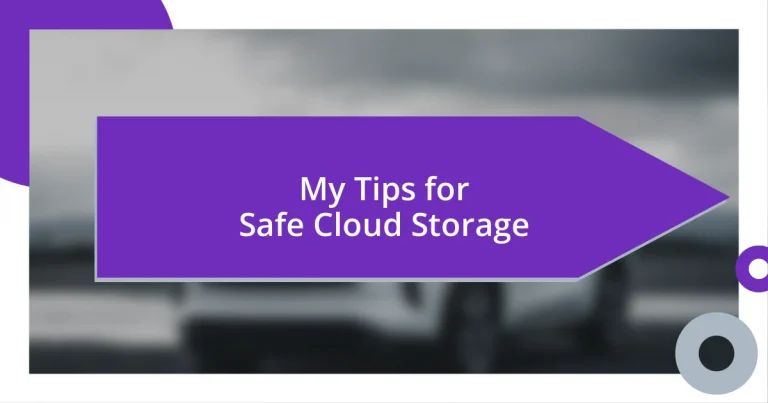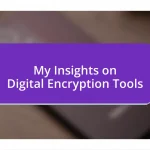Key takeaways:
- Cloud storage offers convenience, collaboration, and data redundancy, enhancing accessibility and security for users’ files.
- Implementing strong passwords, two-factor authentication, and data encryption are vital practices for safeguarding cloud storage.
- Regularly backing up files is crucial for data recovery, providing peace of mind and protection against unexpected data loss.
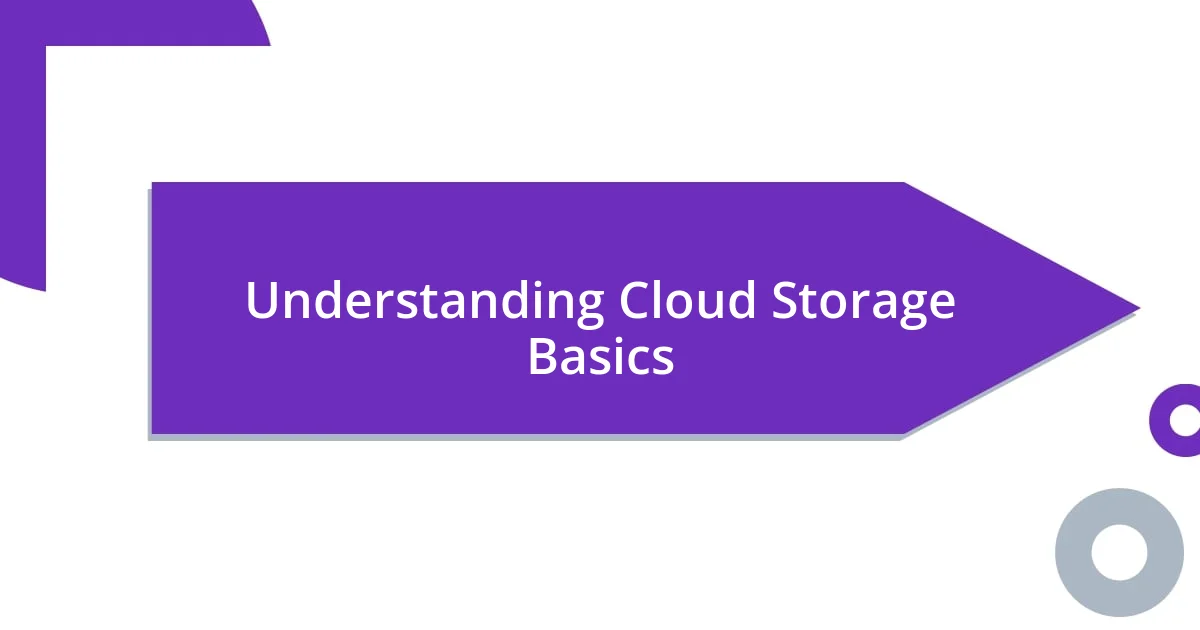
Understanding Cloud Storage Basics
Cloud storage is like a digital locker for your files, accessible via the internet. I remember the first time I tried to explain cloud storage to my mom—she couldn’t quite wrap her head around the idea of keeping her photos somewhere “in the clouds.” It’s fascinating how this technology allows us to store vast amounts of data without worrying about physical space.
When you upload a file to the cloud, it’s broken down into smaller pieces and stored on servers managed by service providers. I often think about how this process is similar to sharing a large pizza—you slice it up and distribute the pieces instead of carrying the whole thing at once. Do you ever wonder what happens to your files when you delete them? Many people assume they’re gone for good, but they often still reside on backup servers, highlighting the importance of understanding data management.
The beauty of cloud storage lies in its convenience and accessibility. Imagine being able to retrieve a cherished document or photo from anywhere in the world with just a few clicks! However, this convenience comes with challenges, like security concerns and potential data breaches, which is why it’s crucial to educate ourselves on best practices for safe storage.
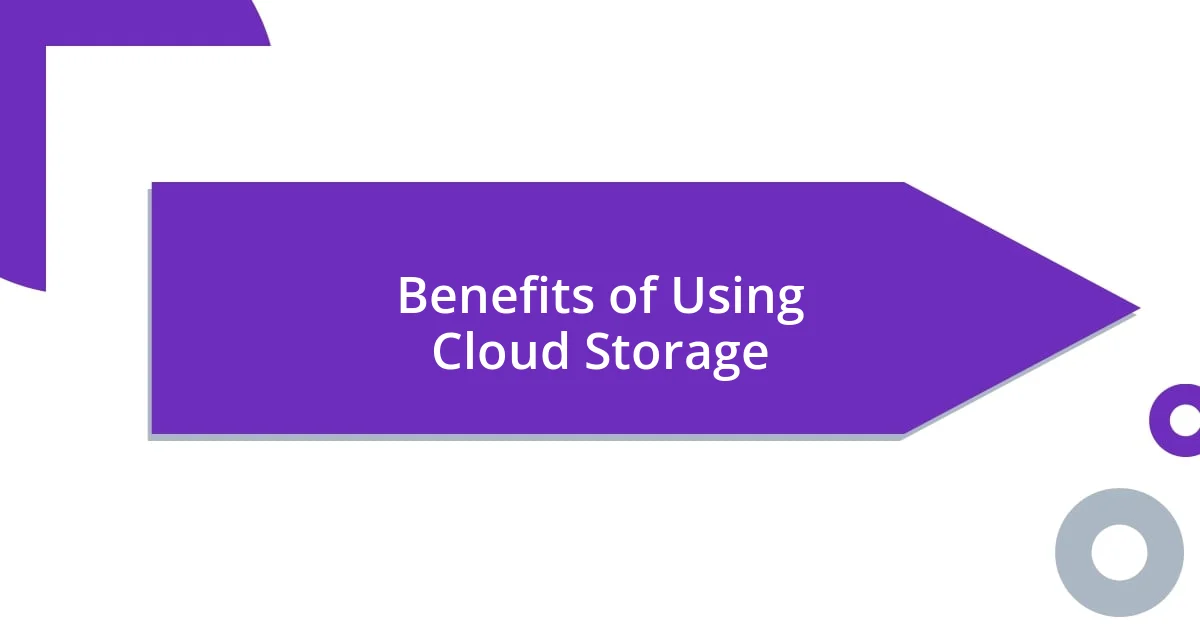
Benefits of Using Cloud Storage
Cloud storage offers remarkable convenience, allowing me to access my files from virtually anywhere. I recall a time when I was traveling and desperately needed a presentation stored in the cloud. Just a few taps on my phone, and I was able to retrieve it instantly, saving the day. This ability to access files on the go not only boosts productivity but also provides peace of mind, knowing that my important documents are just a click away.
Another significant benefit is the collaborative potential of cloud storage. I love how friends and coworkers can work on the same document simultaneously, regardless of their location. This real-time collaboration has transformed the way I approach group projects. I remember working on a team assignment where we could edit our shared document live. It made the process so smooth and enjoyable, turning a potentially chaotic experience into something seamless and efficient.
Lastly, cloud storage typically includes a level of data redundancy, which means my files are backed up across multiple servers. I find comfort in knowing that even if one server fails, my data remains safe and secure elsewhere. This reduces my anxiety about data loss, and I often reflect on how invaluable that security feels, especially when invaluable memories or critical files are at stake.
| Benefit | Description |
|---|---|
| Convenience | Access files from anywhere with an internet connection. |
| Collaboration | Enable real-time teamwork through shared documents. |
| Data Redundancy | Files are backed up across various locations for security. |
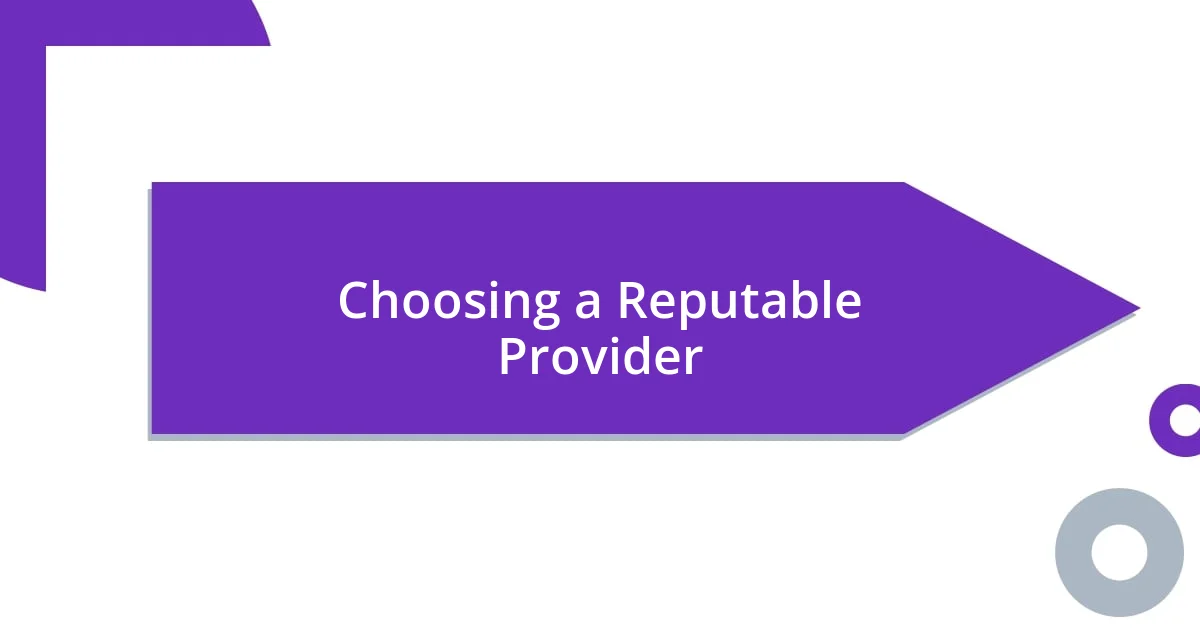
Choosing a Reputable Provider
Choosing a reputable cloud storage provider is one of the most significant steps toward keeping your data secure. When I was selecting my provider, I found myself overwhelmed by the options available. To make an informed choice, I learned to look for essential indicators of trustworthiness, such as clear privacy policies and transparent data handling practices that resonate with my own values.
Here are some key factors to consider when choosing your provider:
- Reputation: Research reviews and testimonials from existing users to assess their reliability.
- Security Measures: Look for features such as end-to-end encryption, data encryption at rest, and two-factor authentication.
- Compliance: Ensure the provider follows relevant regulations, like GDPR, which protects your privacy rights.
- Customer Support: Reliable customer service can make a significant difference when issues arise.
- Data Recovery Options: Understand what measures they have in place for data recovery in case of accidental deletion or breaches.
Investing time in finding a reputable provider pays off in peace of mind. The thought of having my cherished memories, like family photos from a recent vacation, securely stored gives me comfort. Last winter, I faced a server issue with a lesser-known provider, which made me rethink my options, push me to prioritize reputation over price, and ultimately led to a much more satisfying cloud experience.
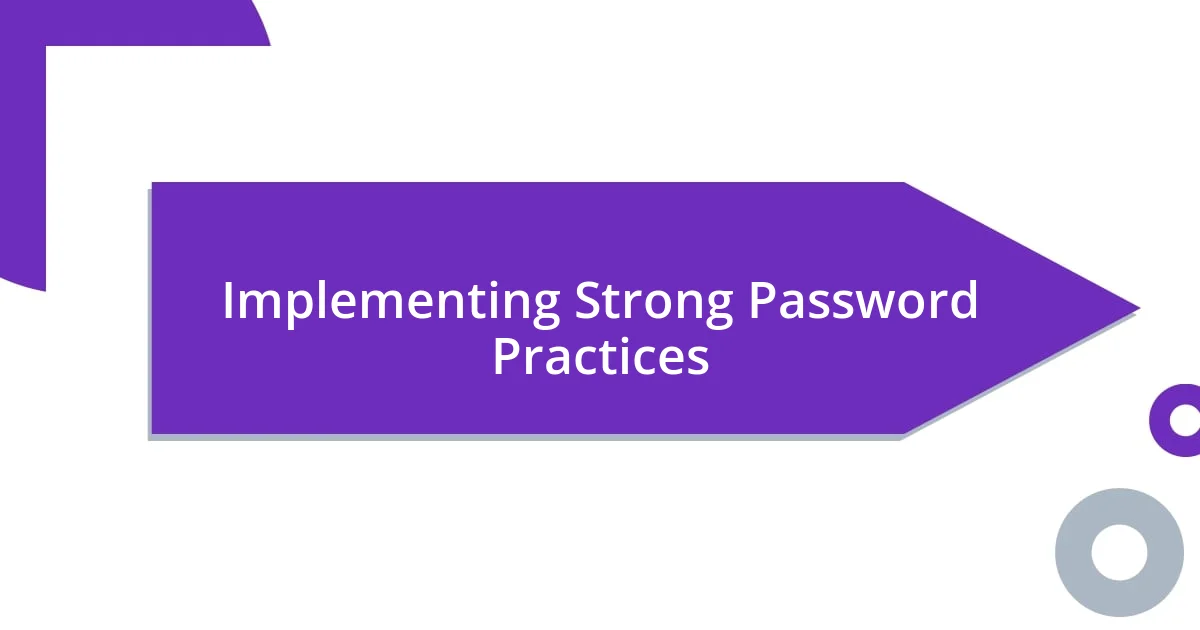
Implementing Strong Password Practices
Implementing strong password practices is essential for safeguarding your cloud storage. I remember the anxiety I felt when I learned about a data breach affecting a popular service. It hit me that even the most trusted providers can fall victim to cyber threats. That’s when I took a closer look at my own password habits. I realized that using a unique, complex password for each of my accounts was non-negotiable. Instead of relying on simple combinations or reusing passwords, I now use a mix of upper and lower case letters, numbers, and symbols. This not only enhances my security but also offers me peace of mind against unauthorized access.
Another strategy I adopted is the use of password managers. At first, I was hesitant, thinking, “Do I really want to rely on another tool?” But after reading about the benefits, I decided to give it a try. After all, trying to remember multiple complex passwords is daunting. Now, with a password manager, I can generate and store strong passwords without the stress. It’s freeing to know I can securely log in without having to recall every detail of my passwords. Plus, using features like two-factor authentication adds an extra layer of protection, which I recommend to anyone serious about their digital safety.
Creating a strong password isn’t just a checkbox on a security list; it’s a crucial part of our daily digital lives. I often think about how much personal information we share online. From bank statements to family photos, everything is just a click away. What if someone got access to that? By making a conscious effort to implement strong passwords and regularly updating them, I feel a sense of empowerment over my data. It’s not just about security; it’s about taking control and protecting what matters most.
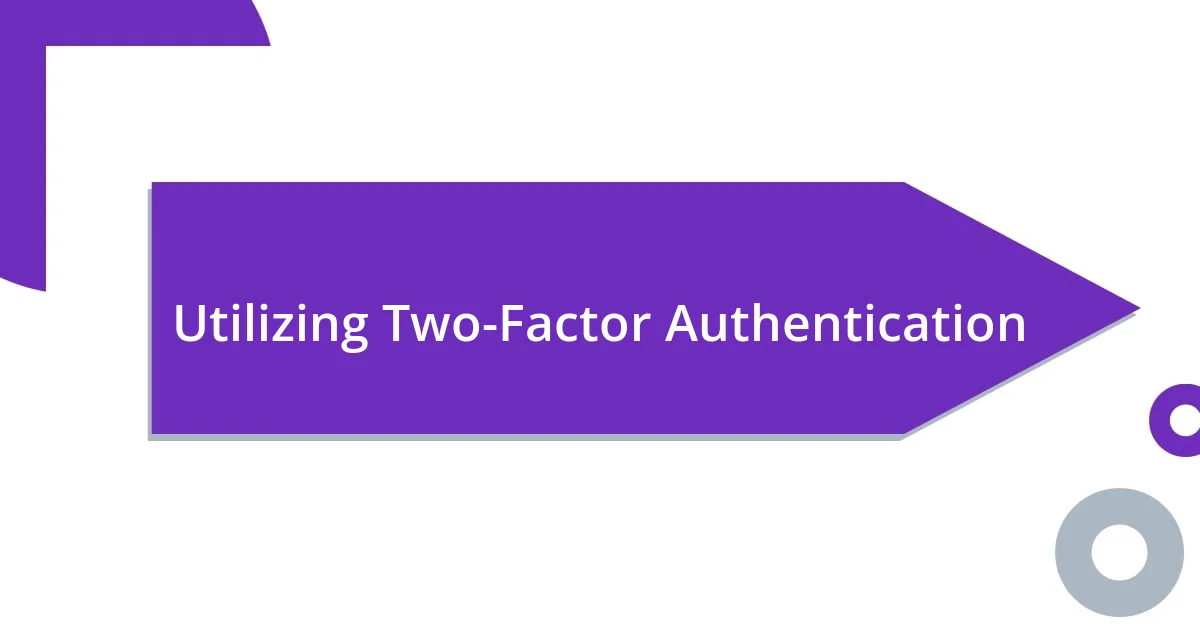
Utilizing Two-Factor Authentication
Utilizing two-factor authentication is a game changer for securing your cloud storage. I still remember the moment I activated it for my accounts, feeling like I had installed a brand new lock on my digital front door. It’s that extra layer of protection that requires not just a password, but also a second form of verification—often a code sent to your phone. This simple step has drastically reduced my anxiety about potential hackers getting into my data.
I was initially skeptical about the convenience of two-factor authentication. Wasn’t it just another hurdle to log in? Then, during a particularly worrying email breach affecting friends, I realized its true value. The thought of someone easily accessing my essential files sent shivers down my spine. I decided it was worth the minor inconvenience, and now, it feels like a safety net that wraps around my most critical information. Have you ever wondered what you would do if your sensitive data fell into the wrong hands?
Being diligent about two-factor authentication has genuinely changed my approach to online security. I often reflect on the times I’ve come close to being phished and how grateful I am for that second step. It’s so easy to let our guards down, but combining this method with strong passwords transforms our security landscape. The peace of mind I experience knowing that even if someone gets hold of my password, they still need that second piece of information is invaluable. It’s like a security blanket that I can’t imagine living without now.
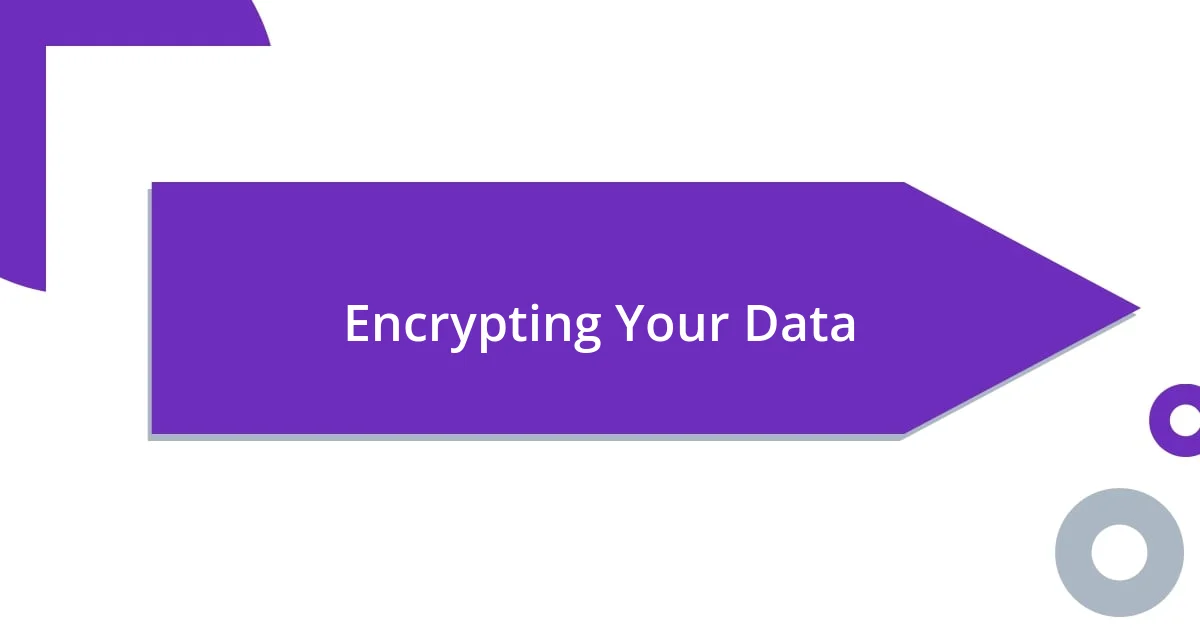
Encrypting Your Data
When it comes to encrypting your data, I can’t help but think about the moment I realized just how exposed unencrypted files could be. I remember storing sensitive documents online without much thought. Then, I came across a story about a hacker exposing personal files, and it sent chills down my spine. That’s when I decided to take action. Encryption is like putting a strong box around my most precious information. It ensures that even if someone manages to breach my storage, they can’t make sense of the scrambled data without the right key. Isn’t it comforting to know that you can add this layer of protection?
There are various encryption methods available, and each has its own strengths. For a while, I used built-in encryption tools offered by my cloud provider, which made setup quite straightforward. But curiosity led me to explore third-party encryption software. This extra step empowered me, knowing I had more control over how my data was secured. I often ask myself, “What’s worth protecting the most?” For me, it’s personal conversations, financial information, and cherished memories—things I wouldn’t want falling into the wrong hands.
Ultimately, encrypting your data doesn’t have to be daunting. I found that taking 15 minutes to set it up made a world of difference. Think about how much time we spend on our devices daily—why not invest a little effort into fortifying our online presence? Trust me, once you experience the peace of mind that comes from knowing your information is safeguarded, you won’t look back. Protecting your digital life is not just a proactive choice; it’s an empowering step towards reclaiming control over your information.
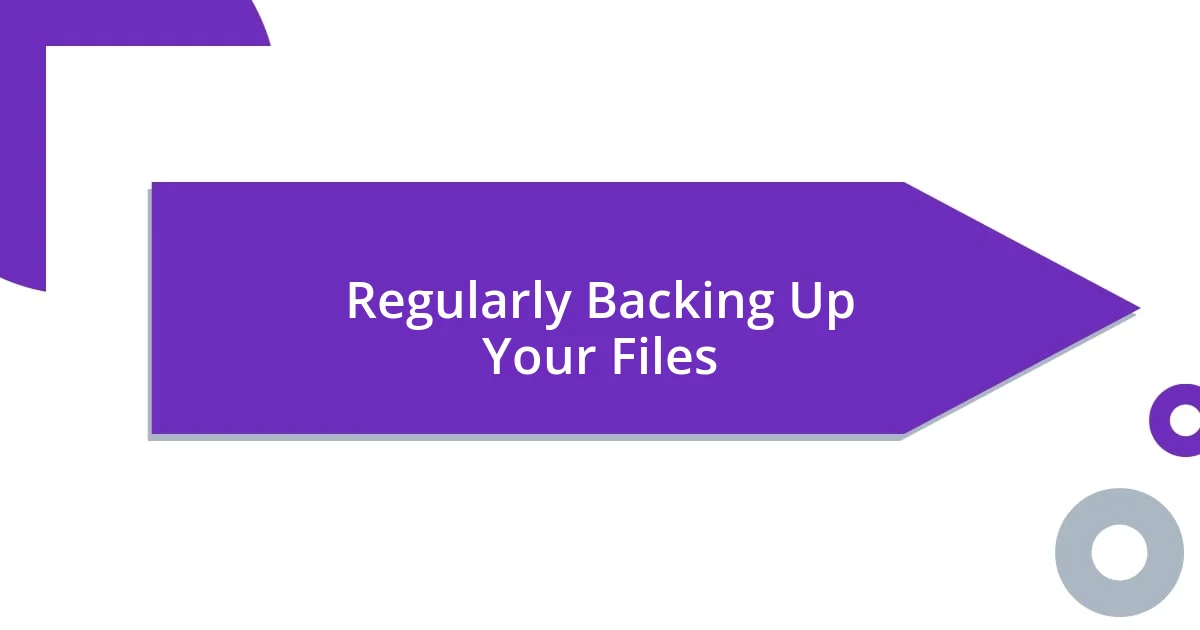
Regularly Backing Up Your Files
There’s nothing quite like the sinking feeling of losing an important file—trust me, I’ve been there. After a particularly chaotic day where I misplaced a work presentation, I knew I needed to step up my backup game. Regularly backing up your files isn’t just a good practice; it’s crucial! Set a schedule—weekly or even daily—and stick to it. You’ll be amazed at how much lighter you feel knowing your files are secure and easily recoverable.
To make my backing up process more efficient, I’ve started using automated backup solutions. It took a little time to get everything in place, but now it runs seamlessly in the background. I can’t tell you how reassuring it feels to have my important files, from vacation photos to financial documents, backed up automatically. Have you ever wondered how often you should back up? I’ve found that the interval really depends on the type of files you work with; if you’re frequently editing or creating new ones, more frequent backups are essential.
What truly drives home the importance of regular backups is the peace of mind it brings. Just last month, a friend of mine experienced a devastating data loss and spent days trying to recover everything. I couldn’t help but think how different her experience might have been if she had implemented a comprehensive backup strategy like mine. It’s truly worth the effort, and ultimately, it’s about protecting what matters most to you. Don’t you owe it to yourself to invest a little time in keeping your digital life secure?












